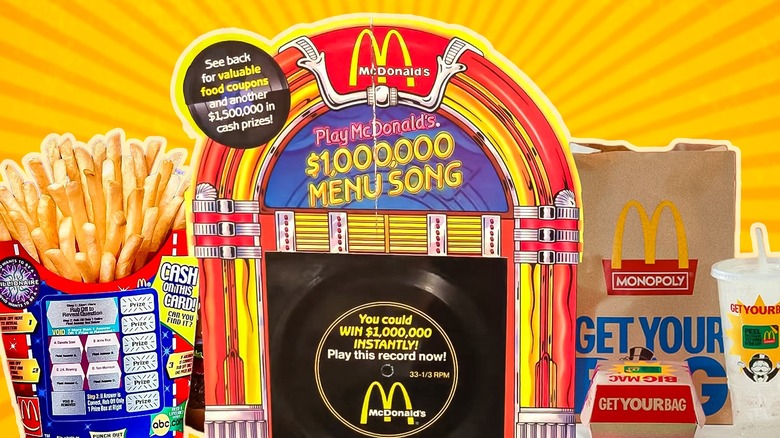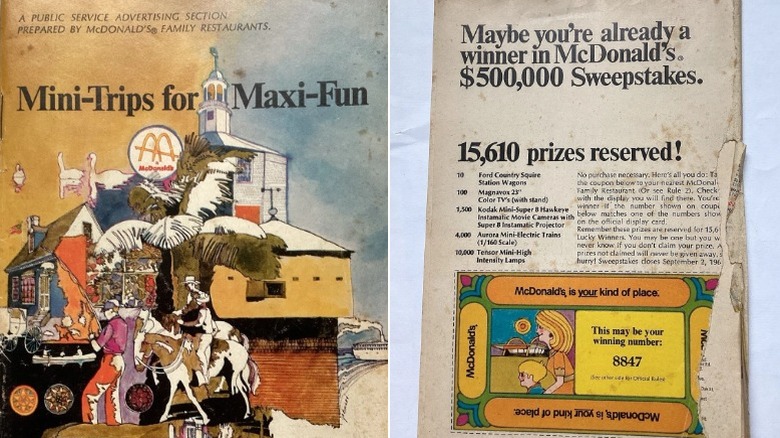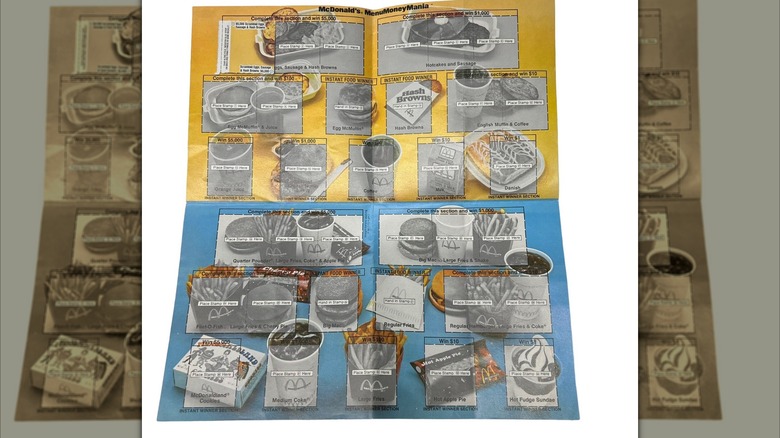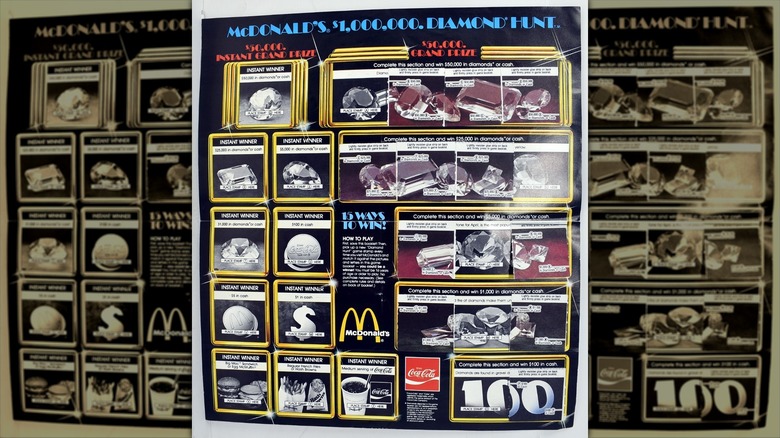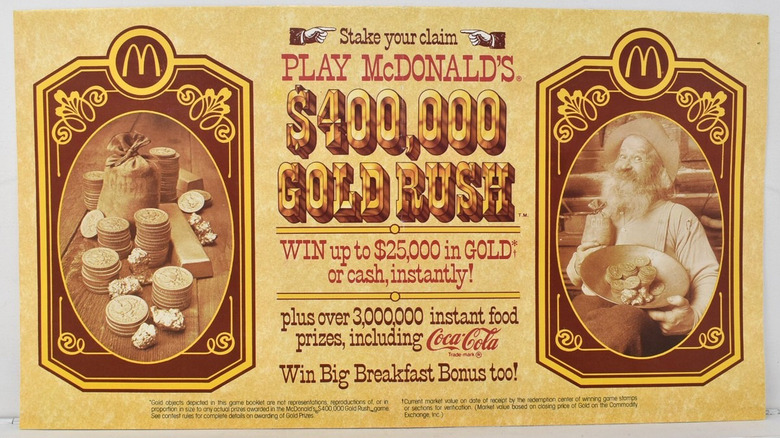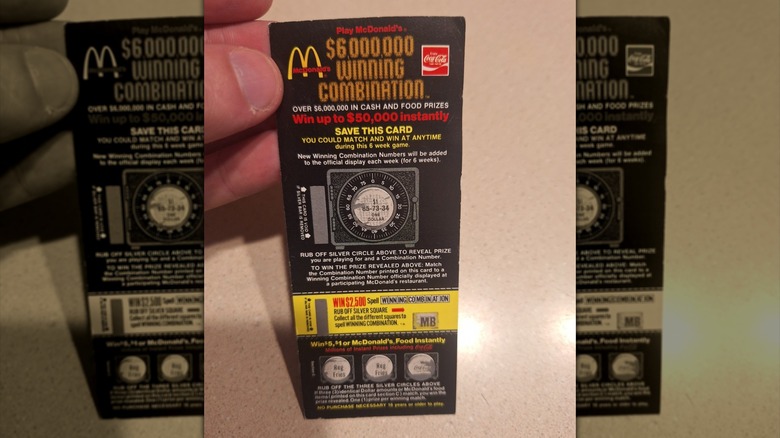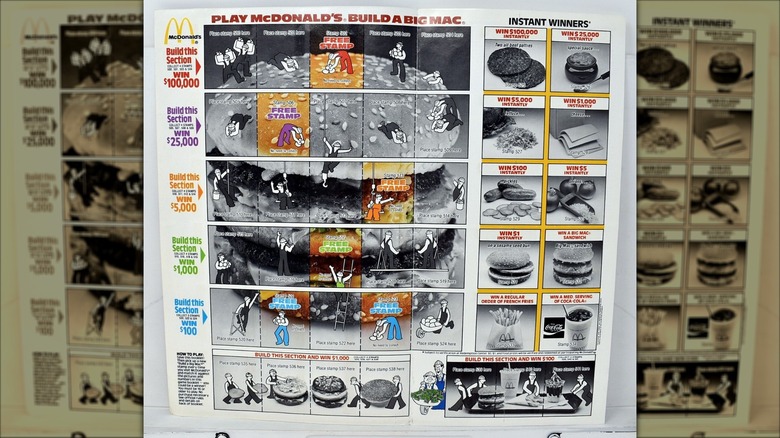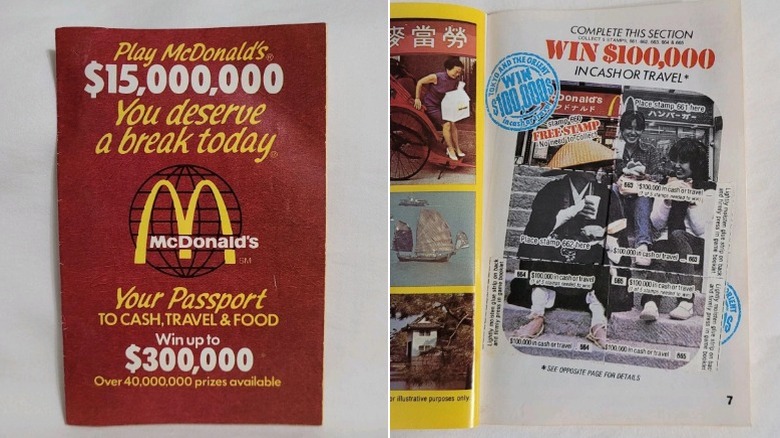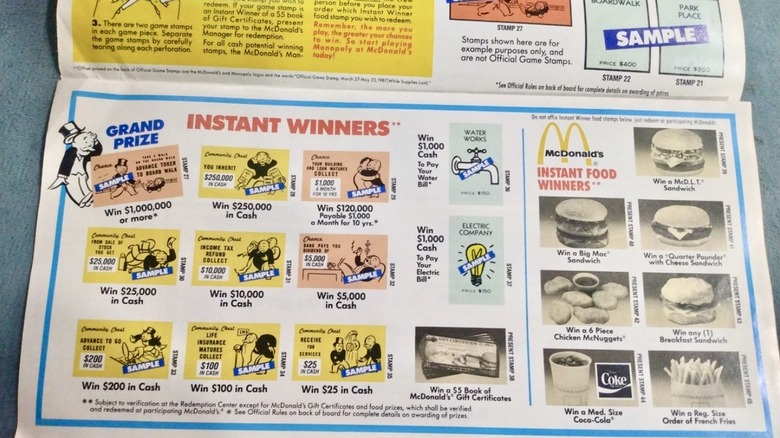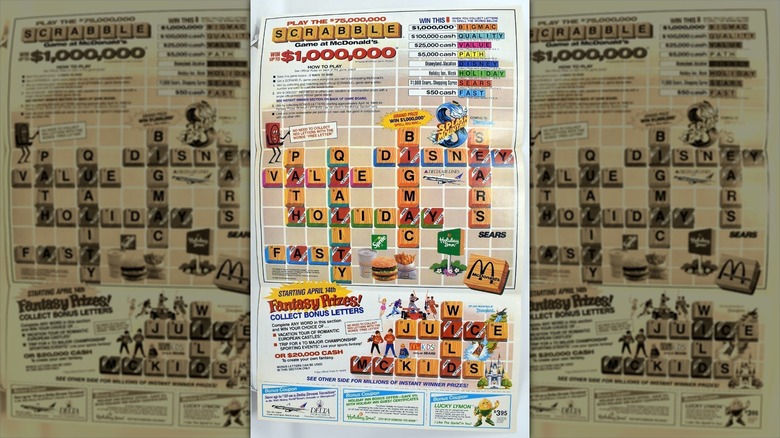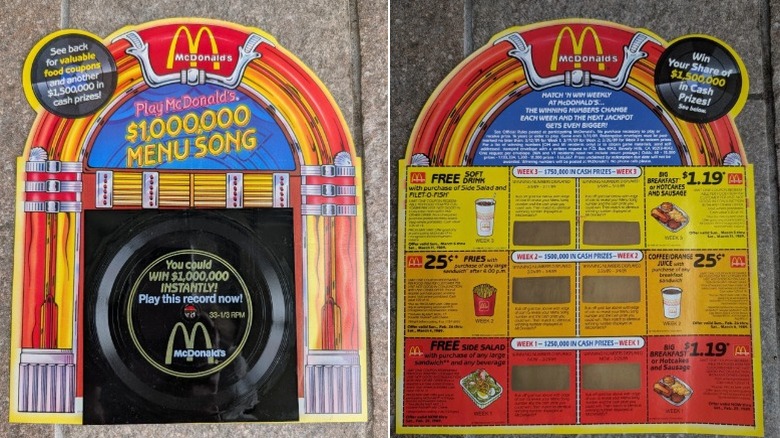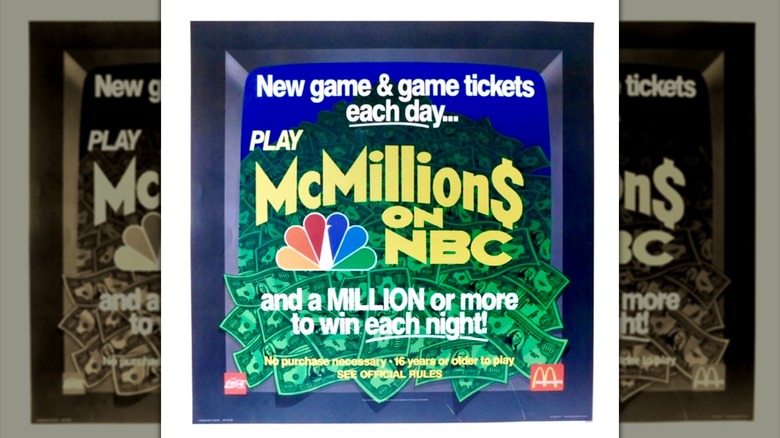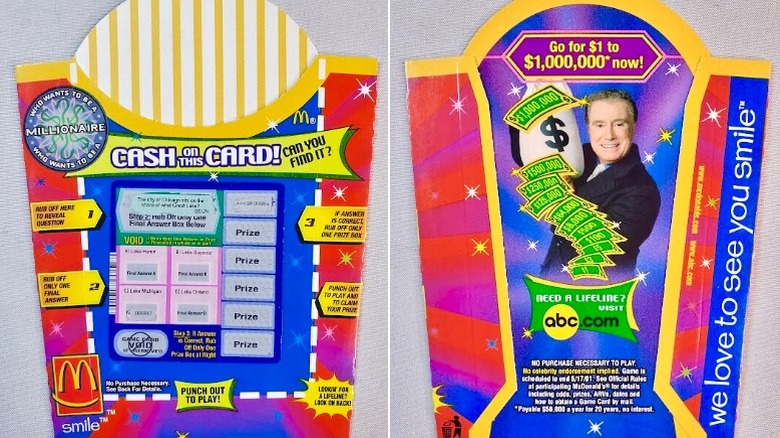The Biggest McDonald's Contests And Games Of All Time
We may receive a commission on purchases made from links.
Everyone loves games and contests. Everyone loves the idea of winning them, no matter how bad the odds are. And everyone has probably loved McDonald's, at least for a period of their life. The Venn diagram where these three incredible topics intersect has entertained us, tempted us with delusions of grandeur, and kept us well-fed in the caloric-intake column for decades. While McDonald's food has certainly served billions, the games and contests it has run have always had one purpose — bringing customers back for more.
When McDonald's began expanding rapidly in the 1960s, local contests and games were used to lure in existing diners and attract newcomers to its hamburgers, fries, and shakes. Early prizes included turkeys for Thanksgiving, vacations in Fort Myers Beach, hi-fi record players, and even flashlights. As the decade wore on, the games grew larger and were soon offered nationwide. Who wouldn't want to win a coveted spot on a hamburger float for McDonald's first entry in the Macy's Thanksgiving Day Parade, back in 1966?
By 1968, McDonald's upped the ante with cash prizes alongside grander rewards like cars and trips around the world. Over the next six decades, as those prize amounts gained more zeroes, the stories behind them became legendary, with everyday people turning into millionaires and scandals erupting when Monopoly winnings were monopolized by a handful of bad McCharacters. Let's revisit some of McDonald's biggest games and contests in its colorful McHistory.
$500,000 Sweepstakes (1968)
In the 1960s, with encouragement from President Lyndon Johnson, America was on the move, taking car trips all over the country. McDonald's picked up on this idea, and in hopes of motorists taking a break from the road at its restaurant, it provided a 24-page booklet called "Mini-Trips for Maxi-Fun." This insert was found in the June 1968 issues of The Bellville News-Democrat and not only pointed out places of interest like the U.S. Mint in Denver and the country's first cattle ranch, but also the promise of winning one of 15,610 prizes being offered, which had a total value of $500,000.
Within the booklet, a page was dedicated to the $500,000 Sweepstakes, which listed the prizes like 10 Ford Country Squire Station Wagons, 100 Magnovox color TVs, 1,500 Kodak Super 8 movie cameras and projectors, 4,000 Aurora Mini-Electric Trains, and 10,000 Tensor Mini High-Intensity Lamps. The page also featured a "winning number" printed on a ticket, which one could check on a display card at their local McDonald's to see if it was indeed a winner.
When the sweepstakes ended, a majority of the prizes went unclaimed. In fact, only 227 out of the 15,610 were doled out, meaning a measly $13,000 in prizes was awarded. These disparaging numbers caught the eye of the FTC, which in 1970 charged McDonald's, promoter D. L. Blair Corporation, and D'Arcy Advertising Company of St. Louis with deceptive practices. The case was absolved three years later, and the parties agreed that future contests would have all of their prizes awarded.
$1 Million Menu Mania (1978 & 1980)
One of the earliest game pieces and game board contests that McDonald's ran was Menu Money Mania. The first iteration launched in 1978, which offered $135,000 in cash prizes and over 1 million food prizes. However, it was only available to play in certain parts of Pennsylvania, Delaware, New Jersey, North Carolina, Ohio, Virginia, and West Virginia. The game board menu was split into a yellow top filled with images of breakfast items like the long-lost inaptly named Danish pastry, and the bottom blue part highlighted the rest of the day's fare, including the beloved McDonaldland Cookies of yesteryear. Match all the pieces for scrambled eggs, hashbrowns, and a delectable McDonald's sausage patty, or a Quarter Pounder, fries, soda, and pie, and net $5,000.
Two years later, Menu Mania returned, where 104,960,000 pieces were put into the world, with 5,216,514 of them resulting in some sort of prize. This game was run at 1,256 participating locations in 27 states and was very similar to the 1978 version. This time, the stakes were a little higher, with $50,000 as the grand prize. Pensacola, Florida, resident Madlyn Coleman was so hell-bent on winning that she visited a McDonald's five times a day to increase her chances. A fellow Floridian, Thomas Morehead of Azalea Park, Florida, beat the odds of one in 26,240,000 to win $25,000 and a photo opportunity with a giant check endorsed by Ronald McDonald himself.
$1,000,000 Diamond Hunt (1979)
In the fall of 1979, diamonds weren't forever, but they were up for grabs for a limited time thanks to McDonald's new game — $1,000,000 Diamond Hunt. There were 347,020 cash or actual diamond prizes up for grabs, which ranged in value from $1 to $50,000, or 10,000,000 free food and drink items. Diamond winners had the choice to acquire actual stones, which were supplied by Zales, or the cash equivalent. If one chose the former, they would receive them unset, and any additional expense, like mounting or setting, was their problem.
These newly deputized diamond hunters tried everything in their power to be a winner. One such hunter, Max Snellenberger, started eating at McDonald's up to four times a week, and even resorted to posting in classified ads to help find his missing pieces. Snellenberger didn't have any luck, but told The Belleville News-Democrat, "I've never won anything," adding, "This contest is the closest I've ever gotten to winning anything." At least he didn't get his hopes up like two high schoolers from Oakland, who jumped the gun, thinking they had won $25,000, but didn't have all the pieces. Feeling slighted, they led a picket with signs that read "McDonald's is NOT our kind of place," and "McDonald's Diamond Hunt is 100% beef."
Gold Rush (1979)
While the 1849ers were all about the gold rush in California, McDonald's was looking to change the fortunes of some of its 1979er customers with its own $400,000 Gold Rush game. This game launched in March that year with 73,220,000 game pieces spread out over 1,108 participating McDonald's in 17 states throughout the East Coast, South, and Midwest regions of the U.S.
The game board was decked out with old-time photos of piles of gold coins, bars, and dust, as well as a bearded prospector, with the headline "stake your claim" across the cover. The winners had the choice of cash or actual gold, in bars or wafers, and were awarded at the market price of gold at the time, which was then worth north of $200 per ounce. In August of that year, Southern California was treated to its own version of the game, but it was only a $200,000 Gold Rush. In 1980, a similar game followed — the $5,000,000 Silver Mine.
One of the sadder tales of this game was that of Mary Graham. She believed to have had the winning $25,000 piece in hand, but was in a rush to catch a bus and threw it in the trash. Later realizing her mistake, McDonald's let her comb through 40 bags of garbage. While the outcome was unclear regarding her garbage prospecting, the restaurant did offer her a free meal every day for the rest of 1979.
$6,000,000 Winning Combination Game (1980)
In the summer of 1980, McDonald's ran a new kind of big-money game — $6,000,000 Winning Combination. In lieu of game piece stickers and a board to affix them to, this one was a scratch-off game, and perhaps one of the first for the chain. The TV ad touted "Never before on Earth has McDonald's offered a game with so many prizes," with the visuals of customers rushing into the classic red mansard roof buildings we no longer see to pick up their card. There were 11,517,208 prizes in total, and they ranged from cash as high as $50,000 to one of 11 million medium sodas up for grabs.
The scratch-off card was mainly black and gray, with McDonald's signature red and yellow colors adding a dash of brightness. The gameplay area was a safe dial, which revealed three sets of numbers and the prize category. You'd have to return to McDonald's to check a board to see if your combination numbers were winning ones. On the same card, you could win food or small amounts of cash, and also collect letters to eventually spell out "Winning Combination," with "AT" turning out to be such a hot commodity that players submitted classified ads in search of it.
$10,000,000 Build A Big Mac (1981)
In the '70s, McDonald's created a catchy jingle that described how it builds its Big Mac — "Two all-beef patties, special sauce, lettuce, cheese, pickles, onions, on a sesame seed bun." In 1981, it turned that recipe into a game called $10,000,000 Build A Big Mac.
The game board was a black and white image of a Big Mac, with a slew of cartoony construction workers hard at work putting it all together. Players collected stamps to try to fill in a row within the picture, with the top of the burger row worth $100,000, and the bottom row a mere $100.
This Big Mac game kicked off on February 16, with 705,610,000 possible pieces that could help someone win one or several of the 40,803,012 prizes in total. It was a contest that not only included U.S. locations, but Canadian ones too (excluding Quebec). You can try to build your own better Big Mac today, but you won't get the same kind of cash rewards as you would in the '80s.
$15,000,000 You Deserve A Break Today (1981)
In 1971, McDonald's launched an ad campaign that spoke directly to its customers — "You deserve a break today." That message resonated over the next decade, and in 1981, it was turned into a game where the "break" suggested much more than rolling in to eat McDonald's food. The $15,000,000 You Deserve A Break Today game pushed the idea of traveling, and instead of a single game board, it was presented as a passport booklet.
Inside this passport, various locales around the globe were highlighted as destinations. The grand prize was $300,000 or the equivalent value to use on a grand trip of your desire. Other prizes included a $100,000 worthy 21-day tour of the "Orient," a $25,000 U.K. adventure, as well as trips to Rio de Janeiro, Sydney, Australia, Hawaii, The Bahamas, and Quebec City.
All in all, there were 6,070 possible cash prize winners, but only 2,912 cash prizes were actually redeemed. While Judith Heithkamp of Manchester, Missouri, won one of the two grand $300,000 prizes, the other was sadly never claimed. McDonald's spokesman Steven Leroy told The Staten Island Advance, "All the coupons are given away to customers. It's up to them what to do with them. If they throw the tickets away, they don't claim the prizes."
Monopoly at McDonald's (1987 and beyond)
One of the most beloved and notorious contests of all time is the Monopoly game at McDonald's. The fever all began when the first version of the game launched in 1987, where a trip around the famous board offered up over $400,000,000 worth of cash and prizes. Its popularity prompted the game's return many times thereafter, in the ensuing decades.
While the odds of winning grand prizes were never going to be in anyone's favor, it was especially true when Jerome "Uncle Jerry" Jacobson became involved in the security and distribution of the pieces. Instead of the winning ones landing on packaging to be peeled in the store, Jacobson hoarded the pieces and embezzled over $24 million worth of cash and prizes over a 12-year span. He, his relatives, and even his butcher benefited from the scheme before it all came crashing down, thanks to an FBI investigation that resulted in Jacobson and others being arrested in 2001. McDonald's wasn't involved in the scam and spent years trying to repair the damage, even running instant million-dollar winning games without pieces.
McDonald's mothballed the Monopoly game in America, but it continued to be played at the chain overseas. In 2025, the allure proved to be too hard to deny, and Mr. Monopoly returned to the Golden Arches, but instead of a physical game board, the pieces were entered and stored on McDonald's app.
$75,000,000 Scrabble (1988)
Alfred Mosher Butts invented Scrabble in 1938, and to celebrate its 50th anniversary, McDonald's turned it into a contest for cash and prizes, adding up to a value of $75 million. The game board kept the spirit of the actual Scrabble game, but all the words were already laid out, and one's game pieces would dictate if you were a winner. Spelling "Big Mac" equaled $1,000,0000, "Disney" a vacation at Disneyland, "Holiday" a week's stay at Holiday Inn properties, and "Sears" a $1,000 shopping spree at the former mega-retailer. There was also a bonus section where one could win a romantic tour of European castles or tickets to a major sports championship.
Musician Clay Hurn was doing the opposite of singing the blues when he was the lucky soul who found the elusive "g" to complete the spelling of "Big Mac." Hurn's plans included funneling the money to cut a record and help promote his band Defiant. Orlando nanny Peggi Ann Smith was an instant million-dollar winner. While she had plans to finish college and travel, she told the Orlando Sentinel, "I'm not going to quit my job until they have a replacement for me." Ray Morales of Sanger, California, earned himself the $1,000 shipping spree at Sears, and the first item on his shopping list was a new lawnmower.
$1,000,000 Menu Song (1989)
In 1989, the hottest Billboard charting song was "Look Away" by Chicago. However, one of the biggest songs that year never charted, thanks to McDonald's $1,000,000 Menu Song contest, where the entire menu was put into a rapid-fire song listing. The melody was created by composer Gary Fry, who told The Chicago Tribune that he put the menu items into a "logical structure that gave [him] a seamless rhythmic approach to the menu items." In the Canadian contest, they even struck a version made in French for its Québécois customers.
The song was pressed to a flexi-disc that could be played back on a record player. 80 million of them were made, making it the largest pressing ever. The discs were distributed in Sunday newspapers, and out of all those discs, only one played the song correctly from start to finish. The winning disc was almost never played, as it was placed in a trash bin. Luckily, a curious 13-year-old boy named Scotty Landreth from Galax, Virginia, rescued it from oblivion and changed his family's fortune.
Almost 30 years later, Vice investigated what happened to the winners, and the results weren't all that rich. Landreth's mother, Charlene Price, passed on the annuity payments and took a lump sum payout instead. Price treated herself to vacations and even purchased the convenience store she worked at and renamed it The Price Is Right. That didn't pan out, and later, a boyfriend emptied her bank accounts. She died penniless.
McMillon$ on NBC (1990)
In 1990, McDonald's teamed up with NBC for a promotional game called McMillion$. It featured a game ticket with a number code, date, and time to tune into the channel to see if it matched the winning number. The contest ran from September 21 through October 21, which coincided with the premiere of many NBC fall shows and mini-series like Jackie Collins' "Lucky Chances," and a two-fer from Danielle Steele — "Kaleidoscope" and "Fine Things." Every night, a million dollars was up for grabs. If there was no winner, the money would roll over to the next night.
The first big winner was an 80-year-old Alabamian named Chester Dorough, who earned $8 million by watching a broadcast of "Ferris Bueller," and planned to buy a new suit. Buying two Happy Meals and watching "Wings" was the winning combo that paid Ephrata, Washington, resident Jean Burck $11 million. Tonya Marie Jackson of Connersville, Indiana, didn't even own a TV, and only found out she won $2 million by checking her number at the store. She planned to use the money to pay medical expenses. Fellow Hoosier Beverly Alexander won the same amount and also missed the airing as her husband was watching the World Series on another channel. Michigander Thelma Bellows had dreams of spending part of her $10 million on a new house and a trip to Puerto Rico, but was disqualified after McDonald's became aware that her daughter was a cashier for the chain.
Who Wants to be a Millionaire (2001)
When the U.S. imported the UK game show Who Wants To Be A Millionaire in 1999, the Regis Philbin-hosted show instantly became a ratings juggernaut for ABC. Two years later, McDonald's wanted to tap into its popularity and ask its customers the same query in the game's name. Without having to try out to be a contestant, one just needed to hop into a McDonald's to play.
The game was only available if one bought an extra value meal, with the card attached to the front of the fry holder. The McDonald's game was set up to mimic the game show, posing a single question with four possible answers. If the player picked the correct answer, then they'd choose one of six boxes to scratch to find what prize they won. If players needed a "lifeline," the back of the fry holder urged them to log onto abc.com for help.
The game wasn't a hit, with CEO Jack Greenberg admitting to The Chicago Tribune that it fell flat. For any players who did participate, they were slighted as this was another game wrapped up in scandal, thanks to "Uncle Jerry" Jacobson's embezzlement of the winning pieces. The FBI's operation into the matter was actually called "Final Answer," in a nod to the game show. Ultimately, the real winner in all of this was Regis Philbin, who had a McDonald's Gold Card, which entitled him to free food for life.
